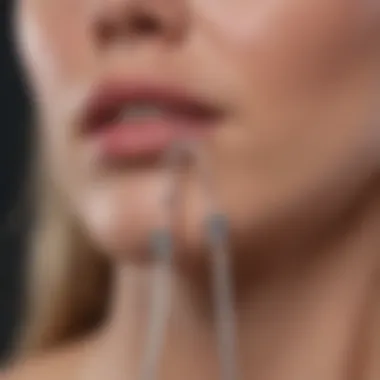Exploring IUDs: A New Approach to Acne Management


Intro
In recent years, discussions surrounding hormonal contraception and its impact on skin health have gained traction. Intrauterine devices (IUDs) are often regarded solely for their contraceptive benefits. However, hormonal IUDs like Mirena and Kyleena offer women a different avenue to explore when it comes to managing acne. This article aims to investigate the potential relationships between these devices and acne management, focusing on their hormonal influences, types available, and the importance of professional medical guidance.
Acne is a common condition affecting women of various ages, often leading to physical and emotional distress. The potential of IUDs to address hormonal imbalances that contribute to acne may represent a significant advancement in treatment options. It is crucial to consider not just individual experiences but also the scientific rationale behind the idea of using hormonal IUDs for skincare purposes. Doing so can empower women with information, helping them make informed choices about their health.
Hormonal Influence of IUDs
Hormonal IUDs release progestin, a synthetic hormone that mimics progesterone. This hormone can have profound effects on the body’s hormonal landscape.
Some potential benefits of hormonal IUDs in acne management include:
- Regulation of Hormones: Hormonal balance is key in controlling acne. By managing levels of progesterone, IUDs may help mitigate hormonal fluctuations that trigger breakouts.
- Reduced Oil Production: Progestin may decrease the production of sebum, the oily substance that clogs pores and leads to acne.
- Inflammation Reduction: Hormonal changes may reduce inflammation associated with acne lesions, promoting clearer skin.
That being said, individual responses to hormonal IUDs can vary. Therefore, it's essential to consult with a healthcare provider before making any decisions. Women should seek tailored advice based on their unique health profiles.
Anecdotal Evidence
Though research is ongoing, several women have shared their experiences regarding the impact of hormonal IUDs on acne. Here are a few common themes reported:
- Improvement in Skin Clarity: Some women report significant improvements in their skin condition after getting an IUD.
- Initial Breakouts: It's not uncommon to experience an initial worsening of acne when starting hormonal contraceptives. Understanding this transitional phase can help manage expectations.
- Long-term Skin Maintenance: Many women note that once their skin stabilizes, they enjoy clearer skin over the long term.
While personal accounts provide insights, they should not overshadow clinical evidence. Comprehensive studies need to be performed to establish definitive conclusions about the connection between IUDs and acne management.
Types of Hormonal IUDs
There are several types of hormonal IUDs available in the market. Both Mirena and Kyleena are popular options, offering distinct benefits:
- Mirena: Known for its higher progestin dose, Mirena can be effective for those dealing with moderate to severe acne.
- Kyleena: This option releases a lower dose of hormones and may appeal to those who prefer a gentler approach to hormone therapy.
Understanding the differences between these devices helps women make informed healthcare decisions suited to their conditions and preferences.
Consulting Healthcare Professionals
Engaging in a dialogue with healthcare professionals is vital when considering IUDs for acne management. A multifaceted approach should include:
- Skin Evaluation: A dermatologist can assess the current state of acne and recommend appropriate interventions.
- Medical History Review: A thorough review of personal medical history ensures that hormonal methods align with individual health needs.
- Continuous Monitoring: Regular check-ins help track skin responses, assess side effects, and make necessary adjustments to treatment.
Foreword to Acne Management
Acne is a common skin condition that affects individuals across various ages, but its management remains a complex topic. The relationship between hormones and skin health is a significant aspect of acne management. Understanding this interconnection can help in choosing the right treatment approach.
Proper acne management not only improves skin appearance but also boosts confidence and significantly enhances quality of life. This article particularly targets women who might be experiencing acne in conjunction with hormonal fluctuations. These fluctuations can occur due to menstrual cycles, pregnancy, or the use of hormonal contraceptives. Knowing how these factors influence acne can lead to more effective treatment options.
There is a growing interest in exploring diverse acne treatment methods. Traditional options like topical creams, oral medications, and lifestyle adjustments are only part of the spectrum. Women increasingly seek other solutions that align with their specific needs, such as hormonal IUDs. Therefore, a critical evaluation of existing treatments against newer options is essential for understanding all potential avenues for effective acne management.
The relevance of hormonal IUDs is particularly compelling, as they have the dual purpose of contraception and potential impact on skin condition. This article aims to unpack this relationship, providing insight into existing treatments, hormonal influences, and the emerging hypothesis related to IUDs. For those navigating the often-frustrating journey of acne treatment, this exploration presents a well-rounded view of current knowledge and possibilities.
Overview of Acne


Acne predominantly occurs when hair follicles become clogged with oil (sebum) and dead skin cells. These blockages lead to the formation of comedones, or pimples, which can manifest as whiteheads, blackheads, or cysts. It typically appears on the face, back, and shoulders. The triggers for acne are multifaceted, involving genetic, hormonal, and environmental factors.
Hormonal fluctuations, particularly during puberty, menstruation, or pregnancy, can exacerbate acne. Androgens, a group of hormones that include testosterone, stimulate the sebaceous glands to produce more oil, which can lead to more severe acne.
Acne can also have emotional repercussions, leading to anxiety or depression. Understanding the nuances of acne formation is critical for determining the right management strategies.
Existing Acne Treatments
Many treatment methods exist for managing acne, varying in effectiveness and mechanism. Common acne treatments include:
- Topical retinoids like Tretinoin, which help unclog pores.
- Benzoyl peroxide, known for its antibacterial properties.
- Oral antibiotics that target bacterial overgrowth in the skin.
- Hormonal medications, such as combined oral contraceptives, can help regulate hormones impacting androgens.
Choosing the right treatment depends on the individual’s skin type, severity of acne, and any underlying hormonal issues. Due to many available options, consultation with healthcare professionals can provide clarity about the best approach tailored to specific situations.
Understanding IUDs
The importance of understanding IUDs in the context of acne management cannot be overlooked. While initially designed for contraception, their potential impact on acne, particularly through hormonal regulation, presents a unique opportunity. Hormonal IUDs can modulate hormonal levels in women, addressing one of the underlying causes of acne. In this article, we will delve into the distinct types of IUDs, their mechanisms of action, and how they could confer benefits to those struggling with acne.
Types of IUDs
Hormonal IUDs
Hormonal IUDs are a type of intrauterine device that releases progestin, a synthetic form of progesterone. This release can lead to a decrease in the ovarian production of androgens, hormones linked with acne formation. The key characteristic of hormonal IUDs lies in their dual function: prevention of pregnancy and potential improvement in skin condition. For women who are both seeking contraception and looking to manage their acne, this combination presents a significant benefit.
Unique to hormonal IUDs, their localized hormone release significantly reduces systemic side effects often associated with oral contraceptives. The advantages include lower rates of hormonal fluctuations and a sustained release of hormones, which can lead to stable skin conditions. However, there are disadvantages to consider such as the potential for irregular bleeding during the initial months.
Copper IUDs
Copper IUDs serve a different function compared to their hormonal counterparts. They primarily create a hostile environment for sperm and do not release hormones. The key characteristic of copper IUDs is their effectiveness in preventing pregnancy without the influence of hormones. As such, they do not have a direct role in managing acne.
The unique feature of copper IUDs is that they provide a non-hormonal contraceptive option. This can be an advantage for women who prefer to avoid hormonal treatments or have contraindications to hormone therapy. However, since they do not impact hormone levels, their relevance to acne management is limited.
Mechanism of Action
The mechanism of action for hormonal IUDs involves the release of progestin, which influences the hormonal milieu within the body. This regulation can lead to reduced androgen levels, potentially alleviating the secretion of sebum and preventing the clogging of pores. The systemic effects are minimal due to the localized action of the hormone, making it a preferable choice for many women concerned about acne. In contrast, copper IUDs operate through a non-hormonal mechanism, making them less relevant for this discussion.
Hormonal Influence on Acne
Acne is commonly linked to hormonal fluctuations. Therefore, understanding how hormones influence skin health is crucial when considering potential treatments. Hormonal changes arise from various factors, including menstrual cycles, pregnancy, and hormonal birth control methods like IUDs. Women often face distinct hormonal challenges that lead to the development of acne lesions.
Role of Hormones in Skin Health
Hormones regulate several functions in the body. They also play a significant role in skin health. Hormonal fluctuations can affect the oil-producing glands in the skin, leading to increased sebum production. The connection between hormones and acne is particularly relevant during puberty, menstruation, and hormonal therapy.
The main hormones that affect the skin include:
- Estrogen: Generally has a protective effect on the skin, promoting moisture and elasticity.
- Progesterone: Tends to increase oil production, potentially worsening acne.
- Androgens: These male hormones, present in both men and women, can stimulate oil glands and contribute to acne outbreaks.
Understanding the precise role of each hormone can help in identifying effective management strategies for acne. Treatments that help regulate these hormones may lead to improved skin conditions.


Androgens and Acne
Androgens are a group of hormones that includes testosterone. They are essential for many bodily functions but can have adverse effects on skin health. Elevated levels of androgens, often seen in women with polycystic ovary syndrome (PCOS) or other hormonal disorders, can lead to an overproduction of sebum. This, in turn, can result in clogged pores and acne.
Research indicates that minimizing androgen levels may help reduce acne severity. Hormonal IUDs, which release progestin, a synthetic form of progesterone, could potentially lower androgen levels in the body. These mechanisms are critical for understanding the therapeutic potential of IUDs in managing acne.
Studies show that women using hormonal IUDs have reported fewer acne symptoms, suggesting a potential link between hormonal regulation and skin improvement.
The Hypothesis: Do IUDs Help with Acne?
The relationship between intrauterine devices (IUDs) and acne management is a relatively new area of interest. While hormonal IUDs are predominantly recognized for their contraceptive benefits, growing evidence suggests they could play a role in managing acne. This section delves into this hypothesis and its relevance in the landscape of acne treatment options.
Understanding how IUDs might affect acne begins with acknowledging their hormonal components. Hormonal IUDs release progestin, mimicking the body's natural hormones. This can lead to a more balanced hormonal environment, which is crucial as hormonal fluctuations are a significant contributor to acne development. For women grappling with persistent acne linked to hormonal imbalances, IUDs might present a non-traditional yet compelling solution.
Moreover, it is important to consider the benefits that might arise from using IUDs for acne management. They offer an alternative to systemic treatments, which can have broader side effects. IUDs can provide localized and sustained hormonal delivery, reducing potential systemic impacts and focusing directly on the hormonal contributing factors to acne.
Nonetheless, the concept is still largely exploratory. There are considerations to keep in mind as well. Individual responses to hormonal treatments can vary significantly. Thus, medical advice is critical to ensure the treatment aligns with each individual's skin health needs.
"The possibility that IUDs can influence acne management opens up new avenues for women seeking effective treatments."
Additionally, while hormonal IUDs may show promise, they do not work universally for every individual. It is essential that women evaluate their unique health situations in consultation with healthcare providers. Overall, this section examines the emerging perspectives on utilizing hormonal IUDs as a tool for managing acne, setting the stage for exploring the current research findings.
Comparative Analysis of Acne Treatments
A comprehensive analysis of acne treatment options is crucial in understanding the potential of intrauterine devices (IUDs) in managing acne. Women have various methods available to address acne, and determining the most effective treatment is not straightforward. As each treatment has unique benefits, limitations, and mechanisms of action, exploring these comparisons provides clarity.
The comparative analysis will focus on how IUDs, specifically hormonal types, stand against traditional treatment modalities such as other hormonal therapies and topical treatments. This insight is vital for women considering alternative acne management options alongside birth control. It sheds light on hormonal regulation of acne and the practicality of integrating IUDs into personal healthcare.
IUDs Versus Other Hormonal Treatments
When comparing IUDs to other hormonal treatments, it is essential to recognize the distinct characteristics and outcomes of each method. Other hormonal treatments include oral contraceptives, hormonal injections, and the patch. Each of these methods can regulate hormones effectively but have varied approaches and side effects.
- Effectiveness: Hormonal IUDs, like Mirena, release progestin locally, offering lower systemic hormone levels. This can reduce side effects compared to the higher systemic hormone exposure from oral contraceptives.
- Convenience: IUDs are inserted and can last up to five years, while oral contraceptives require daily adherence. This is particularly relevant for women who prefer not to manage daily medication.
- Hormonal Stability: The localized hormone release of IUDs aims to minimize hormonal fluctuations, which are often linked to acne outbreaks. In contrast, oral contraceptives may involve more hormonal ups and downs, affecting skin condition over time.
Research indicates that some women report clearer skin after using hormonal IUDs. However, it is also essential to consider potential drawbacks and individual responses.
IUDs Versus Topical Treatments
Topical treatments for acne, including retinoids and benzoyl peroxide, have long been used. However, their interactions with hormonal factors need analysis in light of IUD usage. Comparing these options reveals key distinctions based on administration, effectiveness, and side effects.
- Administration: Topical treatments are applied directly to the skin, offering quick localized effects but often requiring continuous use. In contrast, IUDs work internally and require only one insertion for extended use.
- Effectiveness: While topical treatments may offer immediate results, they do not address hormonal imbalances directly. In cases where hormonal factors drive acne, hormonal treatments like IUDs may prove more effective.
- Side Effects: Topical treatments can lead to skin irritation, peeling, or allergic responses. IUDs, meanwhile, may present different side effects, such as changes in menstrual flow or cramping, thus requiring a thorough consideration.
In summary, while both IUDs and topical treatments can benefit women facing acne challenges, their modes of action, effects, and long-term usability differ significantly. Understanding how these methods compare helps to contextualize the use of IUDs in the broader conversation about managing acne.
Consultation with Healthcare Professionals
Consultation with healthcare professionals is a critical component when considering intrauterine devices (IUDs) as part of acne management. To effectively utilize IUDs, individuals must understand the nuances of their hormonal influences on skin health. Medical professionals can provide essential insights into the appropriateness of IUD use related to acne.
Importance of Medical Advice


Seeking medical advice serves various important purposes. Firstly, healthcare providers can assess a person's medical history and skin condition to determine if IUDs are a suitable option. Unlike over-the-counter solutions, IUDs require individual evaluation due to their hormonal nature.
Secondly, healthcare professionals ensure that patients are well-informed about potential side effects. For instance, certain hormonal IUDs may offer benefits, but they can also lead to undesirable effects like mood changes or changes in skin condition.
Furthermore, professionals provide tailored guidance on the type of IUD that aligns best with each individual’s hormonal profile and needs. This customized approach is vital in optimizing the potential benefits IUDs may have in managing acne.
Finding the Right Healthcare Provider
Finding a healthcare provider skilled in reproductive health and dermatology is also essential. Such specialists can bridge the gap between hormonal treatments and skincare. To ensure a productive consultation, individuals should consider the following:
- Qualifications and Experience: Look for providers with a strong background in gynecology and an understanding of dermatology.
- Referrals and Reviews: Consulting with peers who have had similar concerns is valuable. Recommendations often lead to practitioners with a proven track record.
- Open Communication: A trustworthy provider should foster an environment where patients feel comfortable discussing their skin issues and treatment goals.
Potential Side Effects and Risks
The use of intrauterine devices (IUDs) as a tool for managing acne brings with it a range of considerations related to potential side effects and risks. Understanding these factors is crucial for women considering IUDs for acne treatment. While hormonal IUDs, such as the Mirena, have shown promising results in influencing skin health, they are not without their drawbacks. A careful analysis of these risks allows individuals to make informed choices about their acne management strategies.
Understanding Risks Associated with IUDs
IUDs can cause different side effects that vary by individual and the type of device used. Common side effects often reported include:
- Menstrual changes: Some women experience lighter periods, while others might face irregular bleeding or spotting, especially in the first few months following insertion.
- Pain and discomfort: Insertion can be painful, and some users report cramping or discomfort in the initial weeks after placement.
- Infection: While rare, the insertion of an IUD can lead to pelvic infections. Monitoring for symptoms is essential.
- Perforation: In very rare cases, the IUD can perforate the uterine wall during insertion.
These potential risks present an important aspect of the decision-making process regarding IUDs. A thorough discussion with healthcare providers can help illuminate these risks in depth and prepare individuals for anticipating possible complications.
Effects of Hormones on Acne
The relationship between hormones and acne is a focal point in understanding the potential benefits of hormonal IUDs. Acne can be highly influenced by the presence of androgens, male hormones that can lead to increased oil production in the skin.
Hormonal IUDs work primarily by releasing levonorgestrel, a progestin that alters hormonal levels in the body. This alteration can provide significant benefits for women struggling with hormonal acne. Here are some notable effects:
- Reduced oil production: By modulating androgen levels, hormonal IUDs can decrease sebum production, which is a key contributor to acne development.
- Improved skin appearance: Many users report clearer skin as a result of decreased hormonal fluctuations, thereby lessening breakouts.
- Regulation of menstrual cycles: Stabilizing hormonal levels can also lead to smoother menstrual cycles, which further contributes to overall skin health.
In summary, the hormonal influence of IUDs on acne is a compelling reason for their use in managing this condition. However, it remains essential to approach this option by weighing both benefits and potential risks thoughtfully.
"Hormonal IUDs may provide a dual benefit: contraception and potential relief from hormonal acne. However, one must consider the entire scope of risks involved."
IUDs might be a relevant solution for acne management in some women, but understanding the risks and hormonal effects is essential to finding the right approach for individual skin health needs.
End
In this article, we have explored the potential of intrauterine devices (IUDs) as an emerging option for managing acne, particularly through the lens of hormonal regulation. The findings illustrate a nuanced relationship between IUDs, specifically hormonal types, and their effect on skin health. Understanding this intersection is key for women seeking alternative solutions to traditional acne treatments.
Summary of Key Insights
Several points have emerged from the analysis presented. Firstly:
- Hormonal IUDs can regulate hormonal fluctuations, which is beneficial since acne is often exacerbated by hormonal imbalances, especially androgens.
- Current research, though limited, suggests that hormonal IUDs may reduce acne symptoms for some women, showcasing a potential dual-purpose solution for contraception and skin health.
- Anecdotal reports further reinforce the idea that the hormonal changes brought about by IUDs may lead to clearer skin for certain individuals.
It is essential to note that the effectiveness of IUDs in managing acne can vary among individuals, emphasizing the need for personalized healthcare.
Final Thoughts on IUD Usage for Acne
The use of IUDs, primarily designed for contraception, introduces an interesting consideration for acne management. While the potential benefits are significant, they must be balanced against the possible side effects. Consultation with a healthcare provider remains critical. This ensures an informed approach when considering IUDs as a treatment option.
It is advisable for women to weigh the potential improvements in skin health against the risks associated with hormonal treatments. The decision should be informed by comprehensive discussions with medical professionals, who can offer insights based on individual health profiles and needs.
In summation, while hormonal IUDs may offer a viable pathway for managing acne in some women, further research is necessary. Understanding how these devices interact with hormonal pathways is essential for advancing acne treatment options.



